Over the past six decades since the Delhi Public School, Mathura Road admitted its first batch of students, the number of DPS licensed/affiliated schools in India and abroad has risen to 140. Today they are the most preferred choice of India's upwardly mobile urban middle class. Autar Nehru with Dilip Thakore
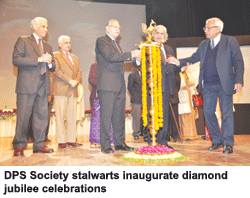 Year-long celebrations in Delhi and NCR (National Capital Region) to mark the 60th anniversary of formal inauguration of the pioneer Delhi Public School (DPS) in Mathura Road (estb. 1949) ended on December 7 with a conference-cum-seminar at Delhi’s Siri Fort auditorium titled ‘Indian Education at the Crossroads’. In attendance were more than 2,000 principals, teachers and staff members of 140 DPS schools in India. The day-long conference was inaugurated by Tejinder Khanna, lieutenant governor of Delhi and guests included incumbent Union minister for water resources Salman Khurshid, Sheila Dikshit, chief minister of the Delhi state government, Lt. Gen (Retd.) J.S. Bawa and Narendra Kumar, chairman of Haranand Publications Pvt. Ltd.
Year-long celebrations in Delhi and NCR (National Capital Region) to mark the 60th anniversary of formal inauguration of the pioneer Delhi Public School (DPS) in Mathura Road (estb. 1949) ended on December 7 with a conference-cum-seminar at Delhi’s Siri Fort auditorium titled ‘Indian Education at the Crossroads’. In attendance were more than 2,000 principals, teachers and staff members of 140 DPS schools in India. The day-long conference was inaugurated by Tejinder Khanna, lieutenant governor of Delhi and guests included incumbent Union minister for water resources Salman Khurshid, Sheila Dikshit, chief minister of the Delhi state government, Lt. Gen (Retd.) J.S. Bawa and Narendra Kumar, chairman of Haranand Publications Pvt. Ltd.
It’s hardly surprising that the diamond jubilee celebrations of the first primary-secondary promoted by the Delhi Public Schools Society (estb. 1937), registered as a “non-profit, non-proprietary, private, educational organisation” to promote pre-primary/nursery to class XII education attracted the country’s top politicians, defence personnel and business tycoons. Over the past six decades since the pioneer DPS admitted its first batch of students, the number of DPS licensed/affiliated schools in India and abroad has risen to 140 with an aggregate enrolment of 275,000 students instructed by an estimated 10,000 teachers. Today they serve as model institutions for K-12 day schools, being the most preferred choice of India’s upwardly mobile urban middle class.
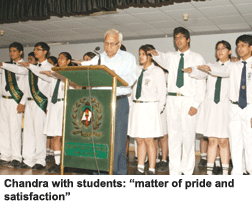 “In the DPS Society we have redefined K-12 education by ensuring the society plays an active interven-tionist and catalytic role so that high standards are maintained in all affiliated schools. The society is actively invo-lved in teacher training, infrastructure development and provision of holistic student-centred education with strong emphasis on nurturing values in all DPS schools. Looking back over 60 years, while we are not entirely satisfied with our progress because that would lead to complacency, we are quite pleased nevertheless with the spread of our distinctive DPS K-12 education culture across India and even abroad. Indeed the fact that high-quality DPS school education is available in the distant states of north-east India, Jammu and Kashmir, the interiors of Madhya Pradesh and West Bengal, is a matter of pride and satisfaction to us within the DPS Society. So is the fact that we have 300 affiliation applications from serious educators pending consideration of the society,” says Ashok Chandra (IAS), former secretary to the government of India in the ministries of oil and petroleum, heavy industry, information and broadcasting and incumbent chairman of the DPS Society. An alumnus of Allahabad University who was inducted into the IAS in 1959, Chandra was first elected chairman of the DPS Society in 2006 and re-elected last year.
“In the DPS Society we have redefined K-12 education by ensuring the society plays an active interven-tionist and catalytic role so that high standards are maintained in all affiliated schools. The society is actively invo-lved in teacher training, infrastructure development and provision of holistic student-centred education with strong emphasis on nurturing values in all DPS schools. Looking back over 60 years, while we are not entirely satisfied with our progress because that would lead to complacency, we are quite pleased nevertheless with the spread of our distinctive DPS K-12 education culture across India and even abroad. Indeed the fact that high-quality DPS school education is available in the distant states of north-east India, Jammu and Kashmir, the interiors of Madhya Pradesh and West Bengal, is a matter of pride and satisfaction to us within the DPS Society. So is the fact that we have 300 affiliation applications from serious educators pending consideration of the society,” says Ashok Chandra (IAS), former secretary to the government of India in the ministries of oil and petroleum, heavy industry, information and broadcasting and incumbent chairman of the DPS Society. An alumnus of Allahabad University who was inducted into the IAS in 1959, Chandra was first elected chairman of the DPS Society in 2006 and re-elected last year.
The excellent reputation of DPS schools is testified by the inclusion of 14 DPS primary-secondaries headed by DPS, R.K. Puram, Delhi in the India’s Most Respected Schools Survey 2010 league table of 143 day schools coun-trywide published by EducationWorld (EW September 2010). Among them, DPS, R.K. Puram is ranked No.8 countrywide (and No.1 on the parameter of academic reputation for the fourth successive year), with the vintage DPS, Mathura Road weighing in at No. 20 and DPS, Noida (estb.1982) ranked 24th.
Indeed such is the pan-India reputation of the DPS Society, that all 11 DPS schools in NCR have been included in the EW 2010 national league table of day schools. Moreover, 11 DPS institutions are listed among the top 86 schools of the Northern Zone with the society’s schools ranked in all four (north, south, western and eastern region) zonal tables. It’s also pertinent to note that in several states of the Indian Union such as Bihar, Gujarat, Orissa, recently promoted DPS schools are ranked in the top quintile.
Yet perhaps the most telling indicator of the awesome countrywide reputation for excellence that the DPS schools have established in the perception of the informed public (the 2,062 sample respondents polled by the well-known Delhi-based market research and opinion polls agency C fore for EW India’s Most Respected Schools Survey 2010 included school principals, teachers, educationists and parents) is that under the parameter of ‘academic reputation’ (day schools), ten DPS institutions have been included in the national Top 10 list (although the Top 10 list has expanded to 31 because of several tied positions) with three DPS schools (R.K. Puram, Bokaro, Bhilai) jointly ranked first, and DPS, Vasant Kunj (Delhi) and DPS, Vashi (Navi Mumbai) jointly ranked third.
“Within a relatively short span of time this professionally managed society has devised excellent institutional manage-ment, teacher training and development systems, which have enabled DPS schools to excel academically. However, it must be noted that DPS institutions are not cram schools; they also pay considerable attention to extra-curricular education and sports. For educators across the country, bagging a DPS franchise is assurance of a scramble for admissions,” says Premchand Palety, promoter-chief executive of C fore (estb. 2000), who has considerable domain knowledge of the education sector.
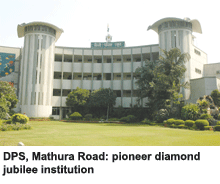 The 140 schools-strong DPS network nationwide traces its origin to a modest primary started by the Rev. J.D. Tytler in 1941 under the name and style of the New Delhi Church High School on the grounds of the Viceroy’s estate in the national capital. When India attained independence from the British, the school was renamed Naveen Bharat School and was shifted to tented accommodation on Mathura Road.
The 140 schools-strong DPS network nationwide traces its origin to a modest primary started by the Rev. J.D. Tytler in 1941 under the name and style of the New Delhi Church High School on the grounds of the Viceroy’s estate in the national capital. When India attained independence from the British, the school was renamed Naveen Bharat School and was shifted to tented accommodation on Mathura Road.
In 1949 the Naveen Bharat School was taken over by the DPS Society and rechristened DPS, Mathura Road with the motto Service Before Self, and was affiliated with the Delhi-based Central Board of Secondary Education (CBSE). Yet it was only in 1956 that the school’s main building was completed and inaugurated by the country’s first scholar vice-president Dr. Sarvapalli Radhakrishan.
Promoter-members of the DPS Society recall that in early post-independence India, the primary-secondaries most favoured by the capital’s elite were the missionary-promoted St. Columba’s (estb. 1942) and the Modern School (estb. 1920), both affiliated with the Council for Indian School Certificate Examinations (CISCE) board, successor to the Cambridge International Exam-ination Board, UK. Very few citizens of Delhi fancied the new DPS, Mathura Road and successor schools affiliated with the CBSE board promoted by the Union education (later HRD) ministry.
Yet one of the major plus points of the DPS Society was that it was promoted by some of the country’s most powerful and idealistic bureaucrats of the early post-independence years including Dr. Prem Kirpal, Dharam Vira and Dr. Tara Chand, who steered the society and used their considerable influence to put the pioneer DPS, Mathura Road on the rails. Ever since, the DPS Society has maintained its tradition of involving powerful bureaucrats of the IAS for expansion and upgradation of the DPS chain. Undoubtedly, given that sustained imposition of post-independence India’s Soviet-style licence-permit-quota regime upon the education sector is one of the country’s best-kept secrets, the IAS network has been a prime factor behind the rapid growth and high standards maintained by the DPS chain across the country.
Evidently, the promoters of the DPS Society were favourably impressed by the Indian Army and defence services schools, notable for the disciplined and holistic K-12 education they provide to the offspring of the officer corps as also to children of the rank and file. Therefore DPS, Mathura Road was modelled after them, and under the knowledgeable guidance of well-informed and committed members of the DPS Society, began to evolve and develop its own distinctive culture, especially after Din Dayal — a former principal of several Army schools — was hand-picked by the society to take charge of the fledgling school in 1962. During his long innings (1962-79) as principal, and subse-quently as chairman of the DPS Society, Din Dayal not only concretised and implemented the then vaguely defined aspirations and ideals of the society, but also shaped and developed the academic culture of the DPS schools, which has made the brand synonymous with excellence in K-12 day school education.
Moreover members of the DPS Society have no hesitation in acknowledging that Din Dayal was also the moving spirit behind the promotion of DPS, R.K. Puram in 1972, and responsible for persuading another legendary DPS principal — R.S. Lugani — to leave the Kendriya Vidyalaya School, Jalandhar to take charge as principal of DPS, R.K. Puram which has since become the model and benchmark institution of the transnational DPS chain.
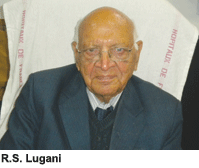 The choice of Lugani as principal of the proposed DPS, R.K.Puram proved inspired, as his three years with the Kendriya Vidyalaya schools (a 952-strong chain of schools established by the Central government mainly for its own employees in transferable jobs) had enabled him to “establish good contacts” in the Union education ministry and become well-acquainted with the complex rules and regulations governing promotion of greenfield education institutions.
The choice of Lugani as principal of the proposed DPS, R.K.Puram proved inspired, as his three years with the Kendriya Vidyalaya schools (a 952-strong chain of schools established by the Central government mainly for its own employees in transferable jobs) had enabled him to “establish good contacts” in the Union education ministry and become well-acquainted with the complex rules and regulations governing promotion of greenfield education institutions.
Secondly, Lugani — a postgraduate of Punjab and Agra universities — had acquired teaching and administrative experience at the Manchester Grammar School, UK where he was visiting faculty for several years. “The board of trustees of the DPS Society comprised very knowledgeable senior people in government who were helpful in putting in a word in the right places and advising us to build excellent insti-tutions. Moreover, being very busy people they gave — and continue to give — a great deal of operational freedom to the principals of DPS schools. Both these factors worked in my favour as I constructed and developed DPS, R.K.Puram into Delhi’s best school,” recalls Lugani who served as principal of this school for 20 years (1972-92), transforming it into the jewel of the DPS crown (aggregate enrolment: 9,500 students and 220 teachers).
“The secret of success of the DPS schools is that right from the start, they had the support of influential and progressive members of the DPS Society who were well aware of the rising need within the emerging middle class of the 1960-70s for co-ed English medium schools with high premium on academic excellence. Therefore they became more appealing than the missionary schools with their insistence upon single sex education in which the teacher-pupil ratios became very lopsided. Moreover the location of the first two DPS schools near the newer south Delhi residential clusters housing the city’s middle class made them a favoured choice,” says Abha Adams, former principal of Delhi’s The Sri Ram School (TSRS). During her long tenure as principal and director of TSRS (1992-2006), following liberal principles of K-12 institutional development, Adams set exemplary standards, transforming TSRS into India’s most respected day school, consistently (except in 2010) topping DPS in the public perception to emerge as the country’s, north India’s and Delhi’s most respected day school in the annual EducationWorld-C fore India’s Most Respected Schools surveys of the past two years (2008-09).
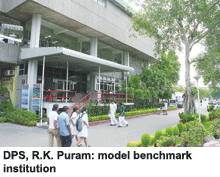 Yet progressive liberal attitudes and academic excellence — of prime importance to middle class parents anxious to prepare their children for admission into prestigious Central government colleges and IITs — apart, the great achievement of the DPS Society has been its ability to scale up operations unlike stand-alone primary-secondaries which top the Education-World annual league tables. To have promoted 140 highly respected schools including 15 abroad within the time frame of 60 years translates into the commis-sioning of more than two institutions per year — not a mean feat bearing in mind that all DPS schools have sound reputations as testified by their long waiting lists. This is proof of excellent franchise management, particularly standardisation skills.
Yet progressive liberal attitudes and academic excellence — of prime importance to middle class parents anxious to prepare their children for admission into prestigious Central government colleges and IITs — apart, the great achievement of the DPS Society has been its ability to scale up operations unlike stand-alone primary-secondaries which top the Education-World annual league tables. To have promoted 140 highly respected schools including 15 abroad within the time frame of 60 years translates into the commis-sioning of more than two institutions per year — not a mean feat bearing in mind that all DPS schools have sound reputations as testified by their long waiting lists. This is proof of excellent franchise management, particularly standardisation skills.
High academic and infrastructure standards are maintained by show-casing the DPS Society’s 11 owned schools (known as ‘core schools’) as models expected to be replicated by franchisees, not only in terms of infrastructure, but also by way of teacher training, student-centred pedagogies and provision of holistic education. Commendably, unlike most excellent K-12 institutions which are wary about adopting the franchise route fearing quality norms dilution, responding to growing middle class demand for high quality affordable (annual tuition fees seldom exceed Rs.50,000) school education, the DPS Society has ventured down the rocky road of franchised growth and expansion with exemplary success by employing “simultaneously loose-tight” controls over licensed affiliate schools.
According to the society’s office in New Delhi, it does not publish a standardised affiliation manual setting out terms and conditions on which affiliation applications will be enter-tained. The indications are that affiliation applications are assessed informally by the society’s chairman assisted by two or three trustees and the society’s director who heads a mini-secretariat in East of Kailash, New Delhi. Subsequently short-listed applications are negotiated bilaterally between the chairman and trustees according to the norms of an “unwritten affiliation model”.
Under a typical affiliation agreement between the society and the applicant of a DPS franchise, the chairman of the franchised school’s board of management has to be a DPS Society member plus the majority board members have to be society members; the principal has to be appointed by the DPS Society, with the promoter of the franchised school designated vice chairman.
Moreover the promoter of the franchised school has to adopt standardised infrastructure, teacher training, and tuition fee norms of the DPS Society’s owned schools in Delhi. “The society maintains a lean management structure and our chairman and office bearers maintain constant contact with affiliated schools by attending their board meetings and discharging other supervisory roles. This is necessary for standardisation of education and other norms across the DPS chain,” explains Renu Mital, director of the DPS Society and founder director of the HRD (teacher training) Centre in DPS Dwarka, New Delhi.
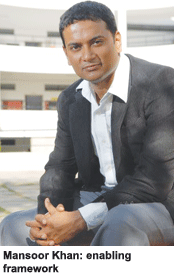 In Indian society where delegation is often synonymous with abdication, and runaway franchisees often despoil the reputation of mother brands, the DPS Society’s simultaneously loose-tight management system works effectively, as evidenced by the excellent reputation DPS licensed schools enjoy country-wide and the enthusiastic public response to them. “The affiliation model devised by the society is exemplary as it draws upon the K-12 experience of the society and enables franchised schools to quickly establish reputations for excellent school education. We have ready models in DPS schools in Delhi according to which we are encouraged to build our institutions and the society provides high-quality teaching workshops in maths, science, English and several other subjects for teachers and a host of co-curricular and extra-curricular options to students. True, the society has a strong presence on the management boards of franchised schools, but within the enabling framework of the society’s rules, we have considerable operational auto-nomy to run our schools,” says Mansoor Khan, promoter of three DPS schools — DPS, Bangalore South (estb. 2001), DPS, Bangalore North (estb. 2002) and DPS Bangalore East (estb. 2006) — which have an aggregate enrolment of 8,000 students mentored by 700 teachers. With another DPS K-12 school under construction in Mysore, Khan quite obviously is more than satisfied with the unwritten DPS affiliation model.
In Indian society where delegation is often synonymous with abdication, and runaway franchisees often despoil the reputation of mother brands, the DPS Society’s simultaneously loose-tight management system works effectively, as evidenced by the excellent reputation DPS licensed schools enjoy country-wide and the enthusiastic public response to them. “The affiliation model devised by the society is exemplary as it draws upon the K-12 experience of the society and enables franchised schools to quickly establish reputations for excellent school education. We have ready models in DPS schools in Delhi according to which we are encouraged to build our institutions and the society provides high-quality teaching workshops in maths, science, English and several other subjects for teachers and a host of co-curricular and extra-curricular options to students. True, the society has a strong presence on the management boards of franchised schools, but within the enabling framework of the society’s rules, we have considerable operational auto-nomy to run our schools,” says Mansoor Khan, promoter of three DPS schools — DPS, Bangalore South (estb. 2001), DPS, Bangalore North (estb. 2002) and DPS Bangalore East (estb. 2006) — which have an aggregate enrolment of 8,000 students mentored by 700 teachers. With another DPS K-12 school under construction in Mysore, Khan quite obviously is more than satisfied with the unwritten DPS affiliation model.
However, not everybody is satisfied with the DPS Society’s affiliation model which requires franchised school managements to pay an annual affiliation and services fee. In 2008, the society “overnight” increased its affiliation-cum services fee for its 129 franchised schools licensed to use the DPS brand from Rs.5 lakh to Rs.25 lakh per year, a proposal which prompted politician (and currently Union minister of water resources and minority affairs) Salman Khurshid, an alumnus of DPS Mathura Road and former president of the DPS Society (1993-2004), to raise the banner of revolt.
According to media reports, Khurshid demanded that franchisee schools be admitted as full members of the society on payment of a one-time fee, and alleged that the DPS Society which is a not-for-profit organisation was “illegally” collecting substantial annual licence fees from franchisee schools. To this end he reportedly wrote to the managements of franchised schools asking them to demand amendment of the DPS Society constit-ution and admit them as full-fledged members. “DPS is exempted from paying income tax. It is not entitled to do business,” he informed a reporter of the Indian Express (September 3, 2008).
Responding, the DPS Society expelled Khurshid from membership, prompting him to move the Delhi high court for a stay order. A single judge of the court declined to issue the stay order but appointed a three-person committee of DPS members to investigate Khurshid’s contention. Following an appeal by Khurshid to a two-judge bench of the high court which was heard in mid-January 2010, the society withdrew the expulsion order against the minister.
Ashok Chandra, incumbent chairman of the DPS Society, is reluctant to discuss the issue. “Differences of opinion are inevitable in every democratic institution. What’s important is that decisions were taken and implemented. Now there is no disagreement on this issue within the DPS family and we are all together,” he informed EducationWorld’s Delhi correspondent Autar Nehru. Although Chandra and other office bearers refused to confirm the current licence/affiliation fee payable by franchisees, the compromise agreement seems to be that the society has dropped its proposal to hike the annual fee five-fold to Rs.25 lakh.
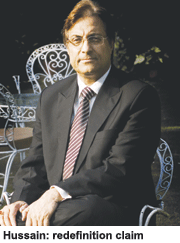 Yet while some disaffection and dissonance rankles within the apex-level DPS Society’s modest offices in East of Kailash, New Delhi — for instance Narendra Kumar chairman of the society for six years (2000-2006) and currently promoter-chairman of the Delhi-based Haranand Publications, steadfastly refused to comment on the DPS Society-Salman Khurshid stand-off — there’s no doubt that at the operational level the society’s simultaneously loose-tight model of growth and development is proving very effective. This is evidenced not only by the long admission waiting-lists of the DPS schools in the national capital region, but also by the growing list of over 300 aspirant educators ready, willing and able to promote schools under the prestigious DPS brand.
Yet while some disaffection and dissonance rankles within the apex-level DPS Society’s modest offices in East of Kailash, New Delhi — for instance Narendra Kumar chairman of the society for six years (2000-2006) and currently promoter-chairman of the Delhi-based Haranand Publications, steadfastly refused to comment on the DPS Society-Salman Khurshid stand-off — there’s no doubt that at the operational level the society’s simultaneously loose-tight model of growth and development is proving very effective. This is evidenced not only by the long admission waiting-lists of the DPS schools in the national capital region, but also by the growing list of over 300 aspirant educators ready, willing and able to promote schools under the prestigious DPS brand.
“Over the past 60 years since this school started teaching children in tents, DPS schools across the country have redefined day school education in modern India. By devising a system for teaching students of differing capabilities to excel academ-ically, encouraging co-curricular and sports education, 140 DPS schools are delivering uniquely holistic education to shape the future leaders of India,” says M. I. Hussain, a former secretary of the DPS Society, founder-principal of the highly-rated DPS, Bhilai, founder principal of DPS, Kuwait and currently principal of DPS, Mathura Road.
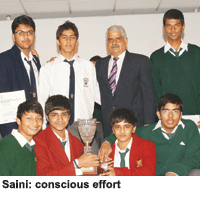 This is affirmed by D.R. Saini, principal of DPS, R.K. Puram, commonly acknowledged as the jewel of the DPS crown which has been nationally ranked first on the parameter of academic reputation in all EducationWorld’s annual surveys of India’s most respected schools over the past four years. “While initially there was a strong focus on academic excellence in DPS schools, in recent times the DPS Society has made a conscious effort to encourage holistic education by prompting all DPS schools to also promote co-curricular and sports education. Thus over the past decade DPS, R.K. Puram has nurtured students who are academic and sports achievers simultaneously. Among them are national team footballer Abhishek Jain; table tennis star Neha Aggarwal; ace shooter Manavjit Singh Sandhu and Anjum Chopra who plays cricket for the Indian women’s team, among others,” says Saini.
This is affirmed by D.R. Saini, principal of DPS, R.K. Puram, commonly acknowledged as the jewel of the DPS crown which has been nationally ranked first on the parameter of academic reputation in all EducationWorld’s annual surveys of India’s most respected schools over the past four years. “While initially there was a strong focus on academic excellence in DPS schools, in recent times the DPS Society has made a conscious effort to encourage holistic education by prompting all DPS schools to also promote co-curricular and sports education. Thus over the past decade DPS, R.K. Puram has nurtured students who are academic and sports achievers simultaneously. Among them are national team footballer Abhishek Jain; table tennis star Neha Aggarwal; ace shooter Manavjit Singh Sandhu and Anjum Chopra who plays cricket for the Indian women’s team, among others,” says Saini.
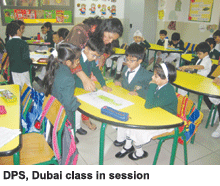 Enthusiasm and admiration for the DPS K-12 institutional development model is more pronounced in the hinterland, beyond the boundaries of Delhi NCR which is relatively well-provided by way of schools and education institutions. “Way back in the 1990s when I wanted to make a mean-ingful contribution to my hometown Jodhpur which didn’t have a high-quality school, I turned to the DPS Society for help. With the society’s committed participation we commis-sioned DPS, Jodhpur in 1998. Currently this school which has an aggregate enrolment of 3,000 students and 100 teachers, is acknowledged as the premier day school of Jodhpur,” says Dinesh Kothari promoter and vice chairman of the school. Spurred by public response to this education venture, Kothari has ventured abroad and promoted DPS franchised schools in Sharjah (estb.2000), Dubai (estb.2003) and is planning one each in Abu Dhabi and Oman.
Enthusiasm and admiration for the DPS K-12 institutional development model is more pronounced in the hinterland, beyond the boundaries of Delhi NCR which is relatively well-provided by way of schools and education institutions. “Way back in the 1990s when I wanted to make a mean-ingful contribution to my hometown Jodhpur which didn’t have a high-quality school, I turned to the DPS Society for help. With the society’s committed participation we commis-sioned DPS, Jodhpur in 1998. Currently this school which has an aggregate enrolment of 3,000 students and 100 teachers, is acknowledged as the premier day school of Jodhpur,” says Dinesh Kothari promoter and vice chairman of the school. Spurred by public response to this education venture, Kothari has ventured abroad and promoted DPS franchised schools in Sharjah (estb.2000), Dubai (estb.2003) and is planning one each in Abu Dhabi and Oman.
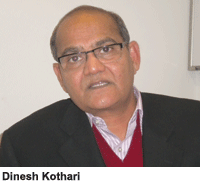 Quite obviously despite policy and ideological rumblings within the apex-level DPS Society, the institutional development model devised by it is structurally sound and augurs well for society as also the public. Little wonder that Ashok Chandra, incumbent chair-man of the DPS Society who was re-elected for a second term last year (2010), is optimistic about the future of the society and blueprint-stage DPS schools.
Quite obviously despite policy and ideological rumblings within the apex-level DPS Society, the institutional development model devised by it is structurally sound and augurs well for society as also the public. Little wonder that Ashok Chandra, incumbent chair-man of the DPS Society who was re-elected for a second term last year (2010), is optimistic about the future of the society and blueprint-stage DPS schools.
“The DPS development model necessitates active involvement of the society with all affiliated schools under the DPS brand umbrella. This model has enabled us to ensure standardisation and maintain the reputation of the DPS brand. Therefore I don’t think we will be able to stretch ourselves to accommodate the 300-plus affiliation applications pending before the society. While we will continue to co-promote new DPS schools, we are also debating the idea of a consultancy wing to advise educationists to promote and/or upgrade their institutions to DPS standards. Additionally, we are examining promotion of teacher training and vocational training institutes countrywide. These are challenging times, and the DPS Society is also changing to meet the new challenges of the 21st century,” says Chandra.
All right-thinking citizens would undoubtedly wish the progressive and enlightened DPS Society will prove itself as successful in its new initiatives as it has proved in promoting and establishing the country’s most respected chain of K-12 day schools.